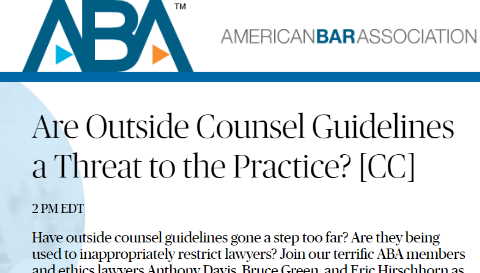Conflicts News — Covid-19 Concerns & Derivative Dual Representative DQ Sought
Posted on
“Prior Work Conflicts in the Age of COVID-19” —
- “Special vigilance is warranted now, however, because the COVID-19 pandemic has created particular ways in which prior work conflicts are rearing their heads.”
- “For example, there is now a great deal of scrutiny surrounding force majeure provisions in contracts. Where your firm is representing a client in a dispute surrounding the force majeure provision in a contract that your firm previously drafted or negotiated, a prior work conflict may exist.”
- “This is particularly true where the client suggests that the firm may have made a mistake by not drafting the force majeure language more carefully. But even where the client has not made that suggestion, a conflict of interest might still exist depending upon the facts and circumstances.”
- “In light of the risks associated with prior work conflicts, law firms should encourage their lawyers to consult with their General Counsel’s office or otherwise seek legal ethics and risk management advice in situations where a client asks the firm to handle a dispute involving a matter on which the firm previously worked.”
“DQ Sought For Attys Repping Co. And Board In Derivative Suit” —
- “Stephen Vance, who is not on the board of Broce Manufacturing Co., contended Tuesday that under Kansas state law, a company’s board of directors cannot retain the same counsel to represent both themselves and the company in a shareholder suit filed on behalf of the company.”
- “Vance asserted that the firms hired to represent Broce and its board — Foulston Siefkin LLP and Lewis Brisbois Bisgaard & Smith LLP — face a further conflict of interest in that they facilitated Broce CEO Alan Vance’s final alleged self-dealing transaction of $5 million.”
- “Under the Kansas Rules of Professional Conduct, the conflict of interest is even more blatant in cases in which the corporation plays an active part in the derivative litigation, as Broce does here, and where the claims against the individual directors are particularly grave, Stephen Vance argued.”
- “Representatives for the parties did not immediately respond Wednesday to requests for comment.”






